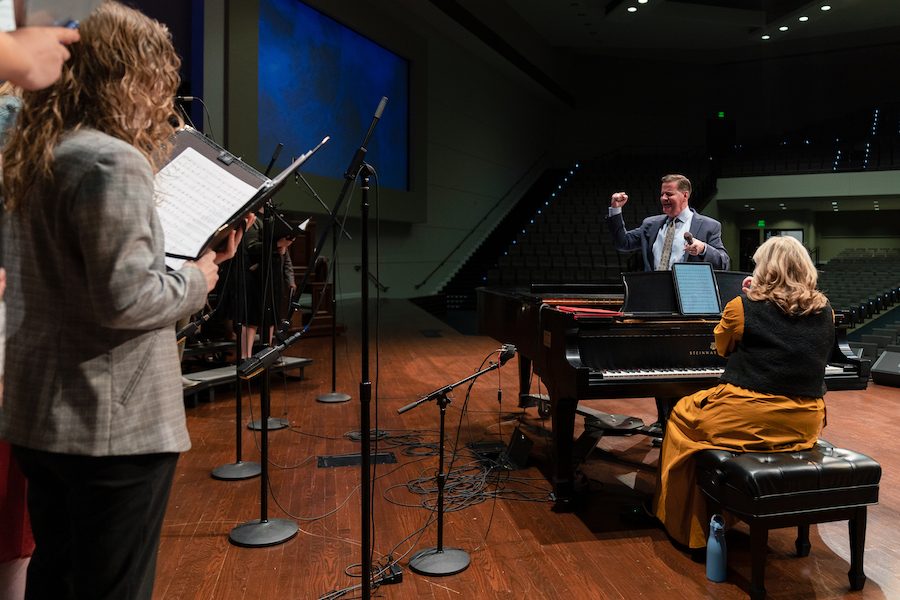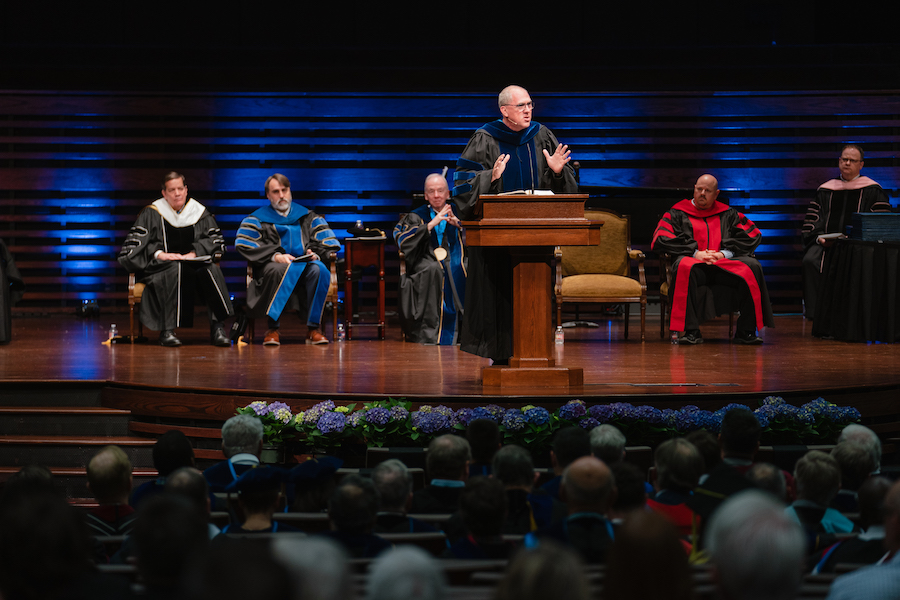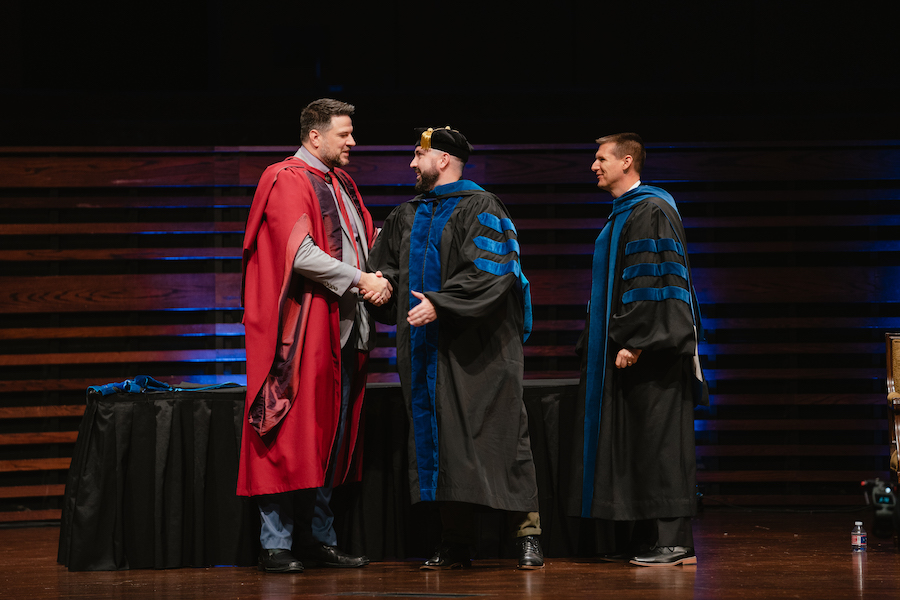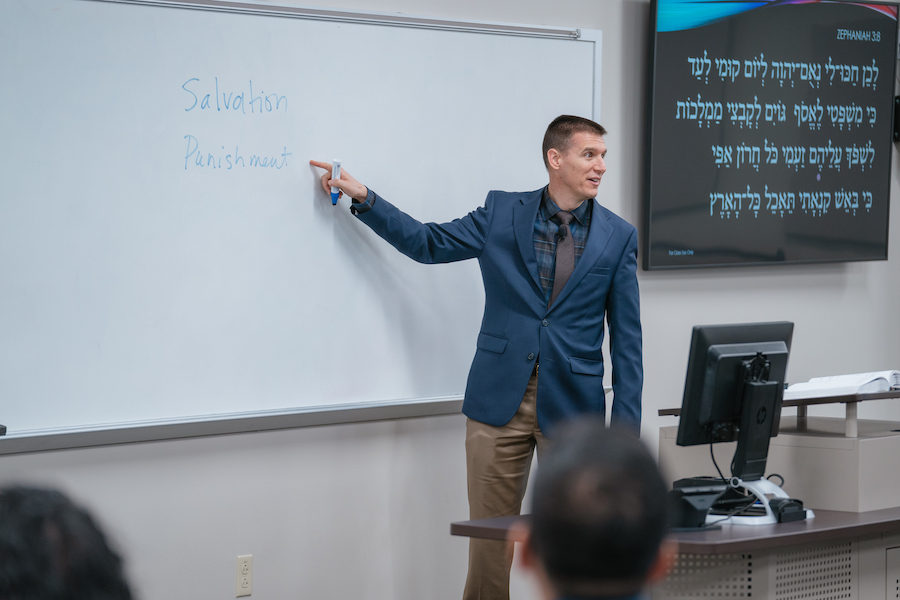Faculty’s hearts ‘burn bright’ with passion for ministry, SWAC members learn
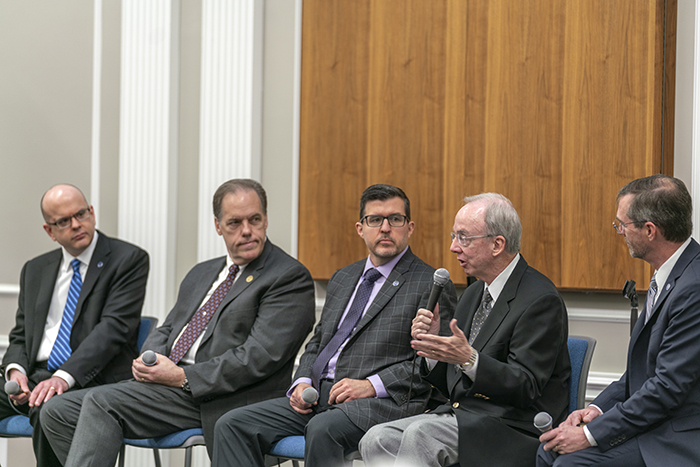

“It’s a new day dawning at Southwestern Seminary,” said President Adam W. Greenway to the Southwestern Advisory Council (SWAC) during their semi-annual gathering, Oct. 21.
The first in a series of events that culminated in Greenway’s inauguration as the ninth president of The Southwestern Baptist Theological Seminary that evening, the morning meeting provided SWAC members the opportunity to hear two panel discussions featuring eight seminary faculty regarding their vision for the seminary’s future, as well as some of the seminary’s new emphases.
“Southwestern Seminary has uniquely always been that seminary that has been so capable of welding together theology and practices,” said Greenway, who moderated the first panel.
“We are no less committed to the highest standards of academics and scholarship than any other institution out there. But our hearts burn bright with a passion for helping people encounter Jesus in a saving way. Those two things are not in tension or antithetical to one another; they complement one another. And that’s the beauty, I think, of what happens here at Southwestern Seminary.”
During the first panel discussion, four seminary faculty delivered remarks about their vision for their time at Southwestern Seminary.
Gregory A. Wills, director of the B.H. Carroll Center for Baptist Heritage and Mission, discussed the importance of Baptist history and heritage. He also emphasized his belief that one does not study history merely because it is interesting, but “because it reveals something about the nature of divine truth.”
History is not authoritative, he said, but it does provide a significant opportunity for reflection.
“One of the best ways we can remember the things we ought not to have forgotten is by promoting the history of those faithful teachers, those faithful servants, those faithful evangelists and missionaries who have gone before us,” Wills said. “That is really at the heart of why I want to lead this B.H. Carroll Center for Baptist Heritage and Mission.”
Next, David S. Dockery, distinguished professor of theology and theologian-in-residence of the Carroll Center, reflected on his excitement to return to his alma mater and serve with his fellow faculty under Greenway’s leadership.
“I believe in the Southwestern commitment to doing theology for the church,” Dockery said. “Southwestern has excelled with having ecclesial theologians. So to be able to come here and help students understand how to do theology for the church in a way that serves Baptist life that equips the saints to be able to take the Gospel to the ends of the earth will be a special privilege.”
SWAC members then heard from John D. Massey and Brent Ray, who have both recently assumed new roles in efforts to reinvigorate Southwestern Seminary’s Great Commission efforts.
Massey, whom trustees elected two days later as dean of the Roy J. Fish School of Evangelism and Missions, noted the unique opportunity current and future students have to study in Fort Worth, a city he says is uniquely situated to be a “laboratory of missions.”
“The DFW area is the fastest-growing metropolitan area in the United States,” Massey said, adding that the metroplex is home to more than 300 unreached people groups.
Students can start their ministries now, serve the nations now, and implement their theological education now, Massey said.
“All we do here at Southwestern Seminary is about making disciples through providing a biblical foundation and through providing instruction in basic Christian doctrine,” Massey said. “But all of those really are for naught if it doesn’t translate into obeying the command that Jesus gave to all of us. And that is to go, make disciples of all nations.”
As the new director of the World Missions Center, Brent Ray shared how Southwestern Seminary has increased its efforts to mobilize students for global evangelism and discipleship.
“We have articulated a new mission statement for the World Mission Center—‘to inform, inspire, equip, network, and engage every Southwesterner in fulfilling the task of the Great Commission in bringing glory to God,’” Ray said.
During the second discussion panel, moderated by Provost and Vice President for Academic Administration Randy L. Stinson, four additional faculty members shared their testimonies and what excites them most about Southwestern Seminary’s future.
Joseph R. Crider, dean of the School of Church Music and Worship, shared his excitement to become a Southwestern Seminary faculty member, joining the legacy of those who served the institution from its beginning.
“I had known for many years that the place to be trained in music and worship was Southwestern Seminary. This was the place,” Crider said. “Everybody who was anybody—starting with I.E. Reynolds and B.B. McKinney, on whose shoulders we stand—were here.”
Associate Dean of the School of Church Music and Worship Charles T. Lewis, an alumnus of the seminary, described his enthusiastic return to the school that trained him.
Lewis said he saw in the seminary, under Greenway’s leadership, a place where men and women could be trained to be theologically grounded, musically excellent, and eager to serve the Kingdom of God in the local church.
“The potential to restore and revitalize the School of Church Music and Worship into its significant influence to equip young men and women, to equip the saints to do the work of the ministry in the local church … I thought the potential for that here was just exponentially off the charts,” Lewis said.
Michael S. Wilder, dean of the Terry School of Educational Ministries, echoed his colleagues’ statements regarding their excitement for Greenway’s vision for the seminary. Joining the Southwestern Seminary faculty, he said, was a reflection of his “deep confidence” in Greenway’s leadership, integrity, and passion.
“I want all six of our Southern Baptist seminaries to be healthy and strong and vibrant,” Wilder said. “But this place, particularly in the field of Christian education, has been known as the best place for Christian education in the entire country.”
Wilder noted that in the more than 100 years of the Terry School’s existence, many people have laid the groundwork for what they are able to do today. Regarding vision for the school, Wilder said, “The way we are expressing it today is this: the Terry School is committed to equipping Great Commission ministers who do four things—teach, lead, disciple, and counsel with excellence. That’s what we are targeted, focused upon. But we want them to do that with excellence.”
Finally, SWAC members heard from Chris Shirley, associate dean of the Terry School and another Southwestern Seminary alumnus serving on the seminary faculty.
“My blood runs Southern Baptist, and my blood runs Southwestern as well,” Shirley said. “So here I am, ready to join hands with the dean to walk this journey of continuing the legacy of the School of Educational Ministries. People like Jack Terry have sweated and bled for their entire lives to be a part of that.”
Shirley concluded that much of what will contribute to students excelling in their theological studies and ministry work is “linking arms with every school on this campus” through the curriculum, degree programs, and relationships.
“Not to see ourselves as different schools,” Shirley said, “but as one school walking together in the process of advancing God’s Kingdom, training men and women to make disciples.”
